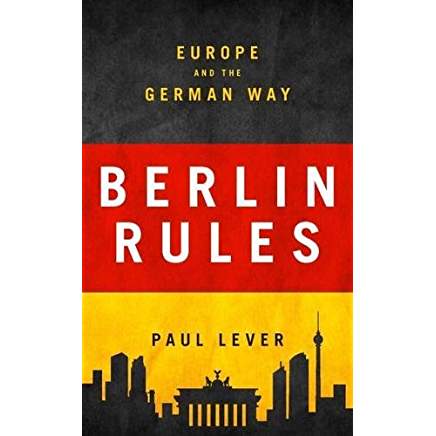Berlin Rules
This book by Paul Lever is brilliant.
It is brilliant in the two senses in which I would use the word when describing a book. The book provides a comprehensive look at a subject and informs the reader without lecturing him.
And secondly, because he shares not only his insights but how he reached them, one can leverage his book to think about the subject which he has defined and analyzed.
With regard to the second, I will write a separate article which does just that, namely leverages the book to look at the way ahead with regard to Germany and Europe, and reach some different conclusions perhaps than Lever.
I have had the privilege of meeting with Lever in the past in his various public service incantations and found always an excellent interlocutor.
But I only learned of this book from our mutual friend Marc Perrin de Brichambaut, who highly recommended reading it.
Thus, on my most recent visit to London I visited Foyles and bought a copy to read over Christmas to think about the year ahead.
Lever provides his assessment of Germany’s role within Europe and how it has evolved from the war through to the eve of Brexit.
His argument is straightforward – the European Union reflects the values and interests of Germany and weaves seamlessly into the German approach to economic policy.
The founding of the Euro created a key venue for Germany to enforce its core economic approach upon those who entered the Euro zone.
And although the gap between Eurozone and non-Eurozone members is an important one within the European Union, the EU has provided the framework for Germany to find its national identity after having it shattered in the flames of defeat in World War II.
He argues that the tensions over migration have introduced a fundamental tension in the European Union which could trigger more fundamental change, but argues that the German political class simply does not contemplate fundamental change in the European Union even with the departure of the United Kingdom.
The Germans have been able to dominate the European Union because of their economic weight and after unification their size relative to other members.
The German political leadership have clearly used the EU to protect German national interests and, indeed, as Lever argues they believe that there is no fundamental disconnect between how Europe should behave economically and what Germany wants.
He focuses as well upon the forces driving change within Europe and relates those forces of change to what might become the evolving German approach. He raises three key questions with regard to how Germans may rethink their approach to Europe and their nation.
“How robust is the German consensus on Europe?
“Will Germany’s politicians continue indefinitely to argue for more integration without having to spell out what exactly this would mean?
“Will its electorate always be willing, even if unenthusiastic to go along with whatever next step is proposed along the road of ever-closer union?” 1
The title of the book is a clever one as it highlights to core of German policy – EU rules should reflect German approaches and one rules through a European process heavily influenced by Germany.
But the tensions facing Europe may well disrupt this approach and force German leaders to consider alternative approaches to the way ahead for both Germany and Europe.
“The failure to address the issue of compatibility between different identities, national and European, has been a feature of the way in which all German politicians discuss Europe.
“Because their own country takes no pride in its past, they assume that an EU can be developed which equally has no collective past to be proud of. They even make a virtue of it…
“The underlying assumption is that the nation states of Europe failed in the past to prevent wars and that therefore the nation state is itself inadequate as an instrument of governance.” 2
The book is chuck full of insights of this quality and provides an insider’s look not just at Germany, but at Britain and other European powers as well.
In other words, although a book focused on Germany, it really is a solid primer for looking at contemporary Europe and the challenges facing it.
There are three challenges facing Germany which the book discusses but I would suggest might provide a fundamental set of challenges which could force significant change in Germany’s approach and how the leadership might address change.
The first is a significant downturn in German economic growth and the development of a very different trade situation facing German industry.
The second is the impact of migration clearly impacts different nations differently and heighten differentiation in the European identity and not convergence.
The third is the return of Russia and the relationship of Germany to core allies, notably the UK and the US.
If Germany really believes in their interpretation of Trump as representing a fundamental secular shift in US policy, then they really need to deal with direct defense as a core national challenge.
But in any case the question is rather simple, how does Germany define its direct defense capabilities and a strategy which could defend the nation against a rogue like Putin who is clearly enhancing Russian nuclear capabilities.
I will deal with these questions I a separate piece.
But the book by Paul Lever provides a solid foundation to think about Germany and the future of Europe.

